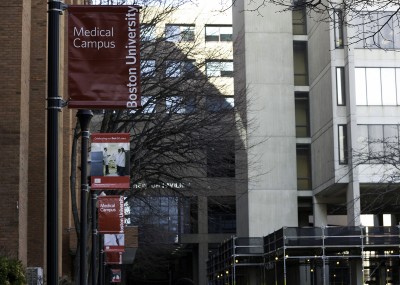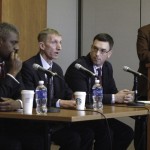
Several faculty members at Boston University’s School of Medicine volunteer yearly to lower their salaries in order to maintain funding for their research when grants decrease, such as those from the National Institutes of Health, BUSM officials said.
Funding fluctuates and not all faculty members can receive the grants they received in the previous year, said David Coleman, the chair of the medicine department at BUSM.
“What some of them have elected to do is say ‘Okay, I’ll take a voluntary pay cut if some of that money, instead of paying my salary, can be used to pay for my research expenses so I can get work done such that I can get preliminary data to get refunded,’” he said. “We don’t reduce their salaries. We say to them, ‘Here’s what your salary would be. We want to help you get funded again.’”
Coleman said NIH funding is variable, which can lead to “salary shortfalls.”
“[For] the faculty on this campus, many of the researchers are on what’s generally called soft money,” he said. “That is, if their funding source goes away, they don’t have a lot of money from the university to pay their salaries.”
Coleman said when professors do not receive the necessary funding to cover their research they go to their department and find a solution that often costs the department.
“Several that have talked to me have actually suggested [salary cuts],” Coleman said. “They’re not giving up all of their pay. They’re just giving up a portion of it. I’ve ended up suggesting that as a possible strategy, but there have been a few faculty who have actually volunteered to do that.”
BUSM spokeswoman Gina DiGravio-Wilczewski said the BUSM lost some NIH funding in 2013, but rebounded in 2014. In the fiscal year 2012, BUSM received 84 percent of its funding from NIH, she said. That figure decreased to 79 percent for 2013 and then increased to 81 percent in the fiscal year 2014.
“Although we did lose funding, it was minimal, as you can see,” she wrote in an email. “Some of those cuts have been restored. BUSM has a strong history of supporting our investigators, and has streamlined the application process, found economies of scale, and has provided pilot funding to encourage new and innovative research and collaborations.”
NIH invests nearly $30.3 billion annually in medical research, according to their website. The amount for the 2015 fiscal year budget totals $29.45 billion, including $715 million in program evaluation financing support.
Susan Fried, a professor in BUSM who researches obesity and metabolism, said many researchers rely on research grants.
“Usually, the institution does sort of what they call bridge. They’ll support you for awhile [and] for many people, that’s sufficient to catch up and get funded some other way,” she said. “It’s a really personal decision. It depends on their age and their financial status. That’s the last option.”
Fried said she understands that funding is important, but it should not necessarily impact researchers’ salaries.
“We’re all working very, very hard,” she said. “We do an enormous number of things that are basically for the institution in many ways, and working 60 to 70 hours a week and taking a pay cut doesn’t feel good. It’s only the last possible option, and it’s a totally personal decision.”
Tarik Haydar, an associate professor in the anatomy and neurobiology department at BUSM, said decreases in research funding is a constant issue that institutions must address.
“In general, the lack of funding is going to hurt every institution and it’s going to force every institution to reevaluate what they’re goals are and how they can meet the demands of the researchers they already have on campus,” he said.
Despite fluctuations in funding, Haydar said he remains hopeful because researchers will continue to make sacrifices for their work because of its importance to society.
“The funding part of it has become incredibly stressful,” he said. “Despite all of that, everyone that I know remains committed to doing their work because they feel like it has a bigger purpose and the capability of making a big difference to people.”


